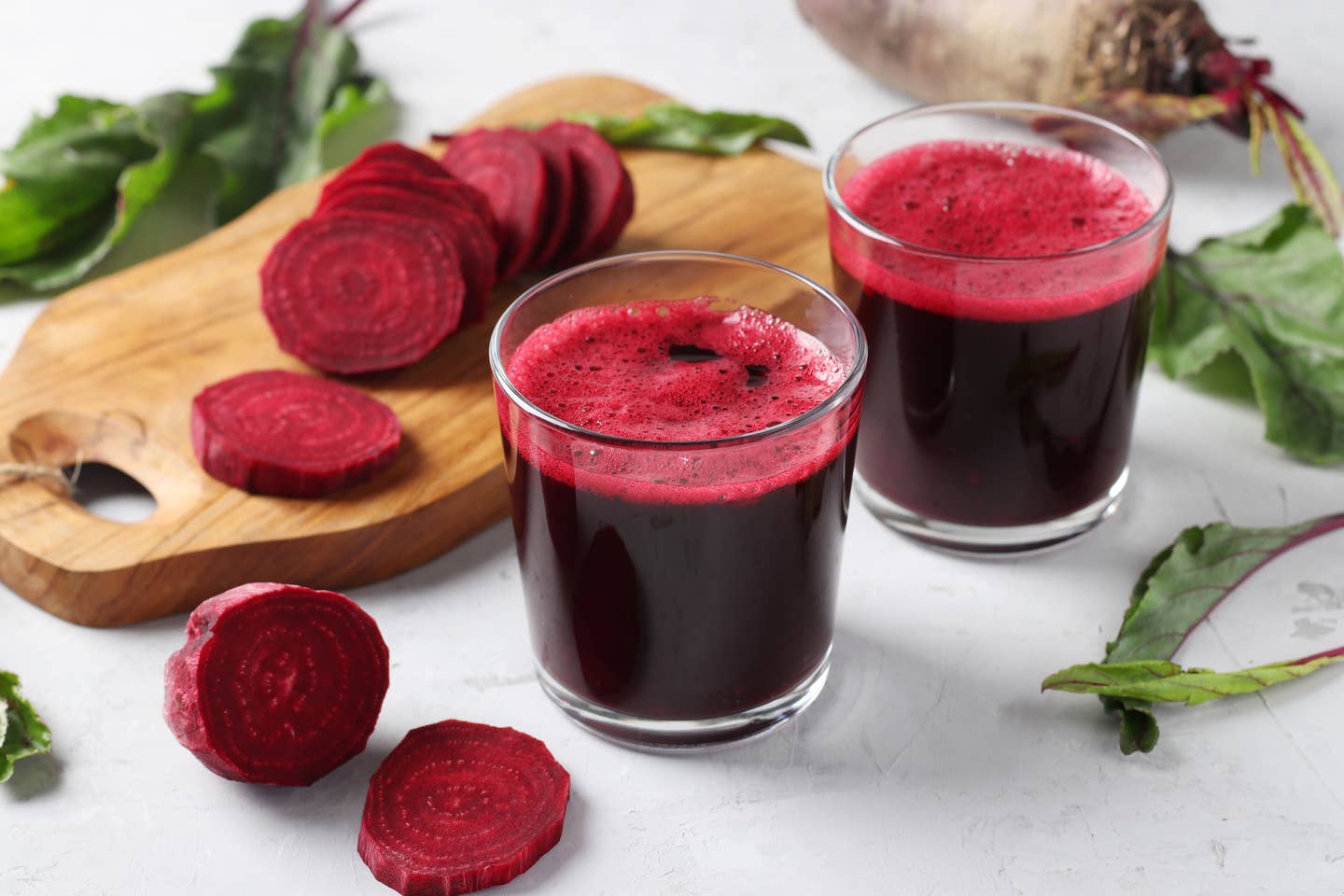
These 3 Health Benefits of Beet Juice Will Make You Want to Drink It Regularly
Beet juice has long been touted as a health elixir that helps fight inflammation, improve athletic performance and boost nitrates. But a new study published in the May issue of Redox Biology has shed some further light on just how incredible nutrient-packed beet juice is for your heart. While the study only had 35 participants, nutritionists not associated with the findings are encouraged by the results.
“This new study found that drinking beet juice was associated with a change in the bacteria in saliva that is indicative of improved cardiovascular health,” said registered dietitian Diana Gariglio-Clelland, RD, CDCES, Next Luxury. “It also resulted in a lower amount of bacteria that tend to promote inflammation, which can lead to cardiovascular disease, stroke, and other chronic diseases.”
For the research, scientists looked at oral bacteria in elderly individuals who supplemented with nitrate-rich beetroot juice for 10 days and determined that they had improved levels of such bacteria, as Mary Wirtz, MS, RDN, CSSD, a registered dietitian, and as a nutritional consultant for parenting site MomLovesBest, further explained. “This oral bacteria-fighting supplementation routine of consuming the beetroot juice has been proposed as a potential target, among others, to ward against cardiovascular and cognitive impairment.” No small feat for a humble root veggie, huh?
1. Research shows beet juice may help your blood pressure levels stay healthy
“[Other] evidence suggests that beet juice improves heart health as beetroot juice has been well-researched due to its blood pressure and cholesterol-lowering effects,” adds Wirtz.
How, exactly does that work? Scientists believe it’s because beet juice is rich in nitrates, which help to relax the walls of your blood vessels. “Relaxed blood vessels [creates] reduced blood pressure, which was found to be true in a study of both younger and older test subjects. People suffering from high blood pressure may benefit from regular beet juice consumption,” says Gariglio-Clelland, referencing this study.
For more on how to lower blood pressure naturally through diet and exercise, read our article here
2. Beet juice may help reduce cancer risk
“Beet juice may help fight cancer,” comments Gariglio-Clelland. “Beets contain antioxidants that can help prevent cell damage and inflammation, which can both lead to cancer,” she continues, pointing to this research.
More specifically, a type of plant pigment called betalains are believed to give beets some impressive qualities in fighting cancer: “Beets get their rich color from betalains, which are water-soluble antioxidants. According to a study held in 2016, betalains have chemo-preventive capabilities against some cancer cell lines in the body,” says Shannon Henry, RD, a registered dietitian with EZCare Clinic, which offers walk-ins and online healthcare services for weight loss plans, nutrition/diet therapies, and treatments. She adds that betalains are thought to be free radical searchers that help find and abolish unstable cells in the body.
3. Athletes may benefit from drinking beet juice
“Beetroot juice has also been researched in athletes as it can raise nitric oxide levels in the human body, which can increase blood flow, improve lung function, and strengthen muscle contractions,” says Wirtz.
“Beet juice improves energy and exercise/workout stamina,” elaborates Henry. “According to a study conducted in 2012, drinking beet juice increases plasma nitrate levels and increases physical performance,” she explains. In this research, trained cyclists who drank two cups of beet juice daily improved their 10-kilometer time trial by roughly 12 seconds. “Similarly, they also reduced their maximum oxygen output,” adds Henry.
How much beet juice should you drink?
When it comes to guzzling the magenta-hued beverage, go for an eight-ounce serving. “Beet juice is rich in vitamin C, potassium, and iron. One eight-ounce portion of beet juice provides 15 percent of the daily value for potassium, eight percent of the daily value for iron, and 15 percent of the daily value for vitamin C,” says Gariglio-Clelland.
“Vitamin C helps support the immune system and fight against inflammation, iron helps build red blood cells and potassium helps to relax blood vessels to promote healthy blood pressure levels,” she elaborates, adding that beets are also a source of plant-based nutrients called carotenoids and flavonoids, which can fight inflammation in your body.
Bottom Line: Not all juices are created equal. “If you are purchasing beet juice, look for a brand with no added sugars,” cautions Wirtz, suggesting that you drink either four or eight ounces.
More From The Beet






